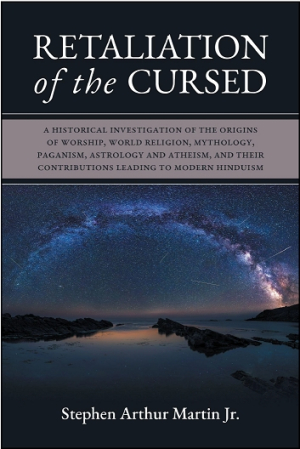Retaliation of the Cursed
A Historical Investigation of The Origins of Worship, World Religion, Mythology, Paganism, Astrology and Atheism, and Their Contributions Leading to Modern Hinduism
Retaliation of the Cursed is an engrossing comparative analysis of the histories of world religions.
Stephen Arthur Martin Jr.’s religious history text Retaliation of the Cursed is an exhaustive exploration of world religions.
The book begins by promising to dig into the origins of contemporary religious traditions and demonstrate how they all connect to modern Hinduism. What follows is a fascinating analysis of ancient myths and traditions, with much attention paid to language. The etymologies of names are investigated at length, and the similarities between figures whose names sound alike are defined. For example, a Chinese name for the divine, “ShangTi,” is identified as being similar to the Hebrew “Shaddai” and the Hindu “Shakti.”
Likewise, similarities between religious practices are compared and contrasted, with the book demonstrating likenesses between the worship rites performed by the biblical Abraham and the priests of ancient Crete. And the relationships between people and situations in myths and religious stories are established with intriguing examples, as of comparisons of Jesus to Osiris, and of Abraham to the Egyptian Abishai. Such comparisons are “intended to bring these writings together to show the ancient intercultural connections.”
The book’s close readings of varied religious traditions is used to demonstrate their unity and suggest a Hindu synthesis. In service of this, the prose is authoritative but clear; each argument is well-defined. Every page features copious footnotes, and a thorough bibliography is included for further reading, with sources like Eerdmans’ Handbook to the World’s Religions cited over a hundred times. However, some such sources are outdated, including the 1906 work The Religion of Babylonia and Assyria. Full color illustrations are included as helpful visual references to the many places, people, and practices mentioned; they are well labeled, with clear citations.
But while the book demonstrates a strong grasp of secondary sources on the world’s religions, its last paragraphs take a sudden turn away from the early suggestions of modern Hinduism’s centrality, and into the realm of Christian evangelism: the book seems to equate Hinduism with Christianity, and asserts “that Jesus’ ways are right.” These deviations from the book’s thorough explorations of the similarities between world religions, which carried a suggestion of equal value, are jarring, suggesting the superiority of one tradition above all the others.
While the book is compelling in its comparative sections, intoning that “ancient legends and lineages were often interpreted in ways to inspire groups of people to believe they were … set aside for a specific purpose,” and bemoaning that the “residue of these propagandas still permeates … modern cultures,” its decisions to trace all religions to Hinduism, and then to present Hinduism as a form of covert Christianity, are made without sufficient supporting evidence. Though it elsewhere has fascinating moments, thorough documentation, and a habit of drawing unique and insightful connections between traditions, its ultimate, unsupported conclusions are troubling.
Retaliation of the Cursed is an often engrossing comparative analysis of the histories of world religions.
Reviewed by
Matt Benzing
Disclosure: This article is not an endorsement, but a review. The publisher of this book provided free copies of the book and paid a small fee to have their book reviewed by a professional reviewer. Foreword Reviews and Clarion Reviews make no guarantee that the publisher will receive a positive review. Foreword Magazine, Inc. is disclosing this in accordance with the Federal Trade Commission’s 16 CFR, Part 255.

